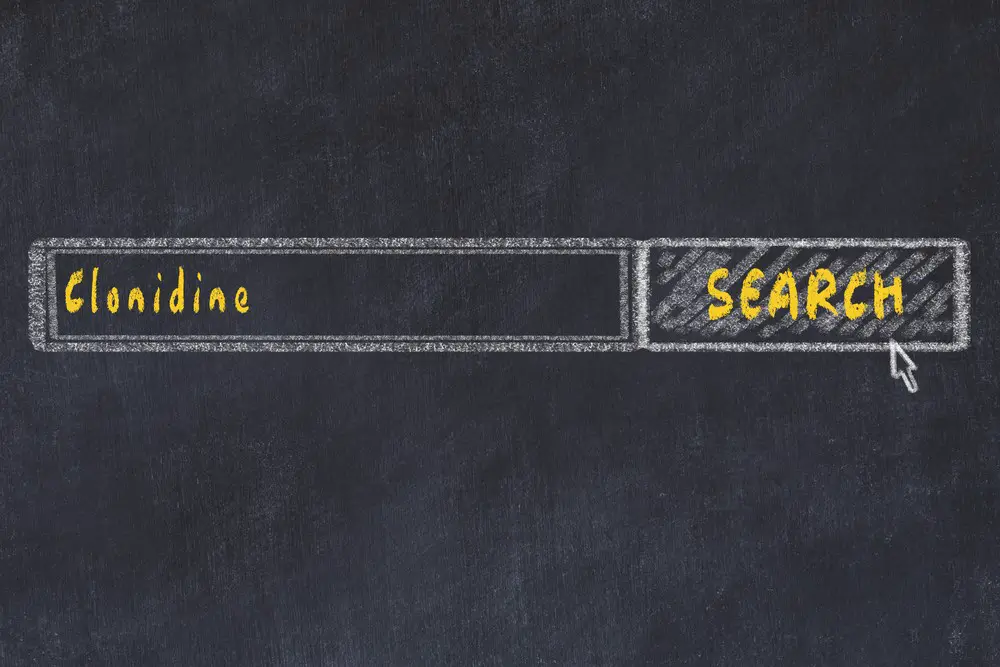As a BetterHelp affiliate, we receive compensation from BetterHelp if you purchase products or services through the links provided
If you’re exploring treatment options for anxiety disorders, clonidine for anxiety may be a potential solution. Clonidine, typically prescribed for hypertension, has been observed to have positive results in treating certain types of anxiety. This blog post will delve into the world of clonidine and its uses in managing anxiety symptoms.
We’ll discuss how clonidine works by affecting certain neurotransmitters in the brain that help regulate mood and stress levels. You’ll learn about the benefits of taking clonidine for anxiety and some potential side effects to watch out for during drug administration.
Additionally, we will guide how to take clonidine safely and effectively while addressing when to consult with a doctor regarding your mental health concerns. Lastly, we’ll touch upon any other vital information before deciding if clonidine for anxiety is right for you.
Table of Contents:
- What is Clonidine for Anxiety?
- The Role of Clonidine in Mental Health Treatment
- A Non-Benzodiazepine Option for Anxiety Relief
- How Does Clonidine Work?
- What Are the Benefits of Taking Clonidine for Anxiety?
- What Are the Side Effects of Taking Clonidine for Anxiety?
- How Should I Take Clonidine for Anxiety?
- When Should I See a Doctor About My Anxiety?
- Is There Anything Else I Should Know About Taking Clonidine for Anxiety?
- Alternative Treatments for Anxiety
- Frequently Asked Questions Clonidine for Anxiety
- Conclusion
What is Clonidine for Anxiety?
Clonidine is a medication primarily used to treat high blood pressure, but it has also been found effective in treating anxiety and other mental health conditions. It works by reducing the activity of certain chemicals in the brain that can cause anxiety, making it an option for those who struggle with this common mental health issue.
The Role of Clonidine in Mental Health Treatment
Clonidine can help modulate neurotransmitters like norepinephrine to treat anxiety symptoms, such as those associated with panic disorder. In some cases, doctors may prescribe clonidine off-label to help patients cope with various forms of anxiety, such as:
- Panic disorder
- Social phobia
- Generalized anxiety disorder (GAD)
- Post-traumatic stress disorder (PTSD)
- Anxiety related to substance withdrawal or detoxification
A Non-Benzodiazepine Option for Anxiety Relief
Benzodiazepines, while frequently prescribed to manage anxiety, may be linked with dependency and addiction issues. An alternative to benzodiazepines, clonidine offers an attractive option for long-term use or when drug interactions are a concern. This makes clonidine particularly appealing when considering long-term use or addressing potential drug interaction concerns.
Treating Childhood Anxiety Disorders with Clonidine
In addition to adult usage, clonidines’ off-label use for anxiety has also shown promise in treating childhood anxiety disorders, including separation anxiety and attention deficit hyperactivity disorder (ADHD)-related symptoms. As with any medication, it is essential to consult a healthcare professional before starting clonidine treatment for children.
Comprehending the capacity of clonidine in treating nervousness can help people settle on educated choices about their psychological well-being care. While this medication may not be the first choice for every person struggling with anxiety, its potential benefits make it worth considering as part of a comprehensive treatment plan.
Clonidine, a medication that may address anxiety, should be discussed with your physician before initiating any new treatment. To make an informed decision, it is necessary to understand how clonidine works and its potential benefits or risks.
How Does Clonidine Work?
Clonidine is an effective medication for managing anxiety, and understanding how it works can help you make informed decisions about your treatment. Clonidine targets alpha-2 receptors in the brain, thus blocking their action and reducing anxiety symptoms. By blocking these receptors, clonidine helps alleviate anxiety symptoms such as restlessness, irritability, and fear.
The Role of Alpha-2 Receptors
One of the critical components involved in clonidine’s mechanism of action is its interaction with alpha-2 adrenergic receptors. Alpha-2 adrenergic receptors, proteins found on nerve cells in the CNS that respond to neurotransmitters such as norepinephrine, are activated by stress or other stimuli and contribute to increased arousal and anxious feelings. When activated by stress or other triggers, these receptors increase arousal and anxiety.
- Inhibition: Clonidine acts as an agonist at alpha-2 adrenergic receptors, binding to them and activating their function. This activation inhibits specific CNS processes responsible for increasing heart rate, blood pressure, and muscle tension – all physical manifestations commonly associated with anxiety.
- Sedation: The activation of alpha-2 adrenergic receptors also produces sedative effects due to decreased release of norepinephrine within the brain. As a result, individuals taking clonidine may experience improved sleep quality alongside reduced anxiety symptoms.
Potential Off-label Uses
Beyond treating anxiety disorders diagnosed explicitly by healthcare professionals, clonidine has also been used off-label for other mental health conditions and symptoms. Some examples include:
- Attention Deficit Hyperactivity Disorder (ADHD): Clonidine may help manage impulsivity, hyperactivity, and inattention associated with ADHD.
- Tourette’s Syndrome: This medication can reduce the frequency and severity of tics experienced by individuals with Tourette’s syndrome.
- Opioid Withdrawal: Clonidine is sometimes prescribed to ease withdrawal symptoms during detoxification from opioids such as heroin or prescription painkillers.
In conclusion, understanding how clonidine works is essential when considering it as a treatment option for anxiety or related disorders. By targeting alpha-2 adrenergic receptors in the brain, this medication helps regulate emotions and behavior while relieving various anxiety symptoms. Furthermore, its off-label uses demonstrate its versatility in addressing other mental health concerns beyond diagnosed anxiety disorders alone.
Clonidine activates specific brain receptors that help reduce anxiety and other mental health-related symptoms. By comprehending the mechanism of action of clonidine, we can start to probe what potential advantages it may possess for those battling with anxiety.
What Are the Benefits of Taking Clonidine for Anxiety?

This medication has been shown to effectively reduce indications of anxiety issues and enhance general psychological wellness. Here are some of the key benefits that clonidine can offer:
Reduced Symptoms of Anxiety
Taking clonidine for anxiety helps calm your mind by reducing feelings of restlessness, irritability, and fear. This medication can relieve these distressing symptoms by blocking certain receptors in the brain responsible for regulating emotions and behavior.
Better Sleep Quality
Anxiety often leads to sleep disturbances such as insomnia or restless nights. Clonidine has been shown to help people suffering from anxiety achieve better sleep quality. Individuals using this medication may find it easier to drift off and experience a more rejuvenating sleep.
Lower Stress Levels
In addition to directly impacting anxiety symptoms, clonidine also works indirectly by helping lower stress levels. High stress exacerbates feelings of anxiousness; therefore, managing stress is crucial when dealing with an anxiety disorder. With reduced stress levels due to clonidine use, you’ll likely experience less severe episodes of worry or panic.
Note: Individual Results May Vary
It’s important to remember that everyone responds differently to medications like clonidine – what works well for one person may not have the same effect on another. Always confer with a medical or mental health expert before commencing any medication to guarantee it is the right option for you.
Considering the potential hazards and consequences of utilizing clonidine for anxiety is essential before initiating therapy, as it may be advantageous in relieving symptoms. Understanding the side effects of taking clonidine for anxiety is essential to ensure safe and effective use.
What Are the Side Effects of Taking Clonidine for Anxiety?

Taking clonidine for anxiety can be beneficial in managing your symptoms, but it’s essential to be aware of potential side effects. Though some may not experience side effects, others could suffer more severe reactions. Here are some common side effects associated with clonidine:
- Dry mouth: This is a frequent complaint among those taking clonidine. Drinking water and chewing sugar-free gum can help alleviate this symptom.
- Constipation: To prevent constipation while on clonidine, consider increasing your fiber intake through fruits, vegetables, and whole grains or using over-the-counter stool softeners after consulting with your doctor.
- Dizziness: Standing up slowly and avoiding sudden movements can help minimize dizziness caused by low blood pressure.
- Drowsiness: Feeling sleepy is another common side effect of clonidine; therefore, avoid driving or operating heavy machinery until you know how the medication affects you.
- Headache: Over-the-counter pain relievers like acetaminophen or ibuprofen may relieve headaches caused by clonidine use.
- Nausea and vomiting: If these symptoms persist or worsen over time, consult your healthcare provider about possible solutions, such as adjusting dosages or trying alternative medications.
- Low blood pressure: Clonidine has been known to cause low blood pressure in some users. You must inform your doctor immediately if you experience lightheadedness, fainting, or dizziness.
It is essential to know that this may not cover all the possible side effects. If you take clonidine for anxiety and observe any strange symptoms, speak with your healthcare provider immediately. For more information on the potential side effects of clonidine and how to manage them, visit the Mayo Clinic’s comprehensive guide.
Remember that everyone reacts differently to medications; what might work well for one person may cause adverse reactions in another. Always communicate with your healthcare provider about any concerns or questions regarding your medication.
Before beginning treatment, it is imperative to be conscious of the potential consequences of utilizing clonidine for nervousness. To obtain maximum efficacy, it is vital to be cognizant of the correct usage of clonidine for anxiety.
How Should I Take Clonidine for Anxiety?

Adhering to your doctor’s or pharmacist’s instructions is essential for safely and effectively using clonidine to manage anxiety. Here are some tips on how to take clonidine safely and effectively:
Follow Your Doctor’s Instructions
Always take clonidine precisely as prescribed by your healthcare provider. Strictly adhere to the dosage instructions provided by your doctor or pharmacist. If you have any questions about dosing, don’t hesitate to ask your healthcare professional.
Create a Routine
To ensure consistent results, try taking clonidine at the same time each day. Establishing a fixed intake schedule can help keep the drug’s concentration in your body stable and make it simpler to remember when you need another dose.
Avoid Alcohol and Certain Medications
- Avoid consuming alcohol while taking clonidine, which may increase drowsiness and other side effects.
- If you’re taking other medications, inform your doctor before starting clonidine therapy since certain drugs may interact negatively.
- Your physician might need to adjust doses accordingly or recommend alternative treatments if necessary.
Note Possible Side Effects
Be aware of potential side effects while using this medication, such as dry mouth, constipation, dizziness, drowsiness, etc., so you can report them promptly should they arise during treatment (refer back to Heading 4).
Don’t Stop Suddenly
Do not cease clonidine usage abruptly; rather consult your doctor for a safe tapering plan to minimize withdrawal symptoms. Instead, consult your doctor about a safe tapering plan to minimize withdrawal symptoms and prevent potential complications.
Incorporating these guidelines into your daily routine can help ensure the best possible outcome when using clonidine for anxiety management. Always communicate openly with your healthcare provider about any concerns or questions regarding this medication.
Taking clonidine for anxiety can be a great way to manage symptoms, but it is important to consult your doctor before starting any new medication. It’s essential to confer with a healthcare practitioner when seeking assistance and evaluate all potential treatments to decide which is best for you.
When Should I See a Doctor About My Anxiety?
If your anxiety is severe enough to disrupt daily life or you have thoughts of harming yourself or others, seek medical help immediately. There are several signs and situations when reaching out to a healthcare professional for your anxiety is necessary:
- Persistent worry: If you constantly worry about various aspects of your life, even when there’s no apparent reason for concern, it might be time to consult a doctor.
- Sleep disturbances: Anxiety can often lead to sleep problems like insomnia. If you’re struggling with falling asleep or staying asleep due to racing thoughts or excessive worry, consider talking to a healthcare provider.
- Physical symptoms: Anxiety can manifest in physical ways, such as headaches, stomachaches, muscle tension, and fatigue. If these symptoms persist despite self-care measures like relaxation and exercise, seek professional help.
- Avoidance behavior: When anxiety leads you to avoid social situations or other activities that were once enjoyable because they trigger feelings of fear and unease, this could indicate the need for intervention from a mental health expert.
In addition to seeking help from medical professionals when needed, numerous online resources provide support and guidance on managing anxiety effectively. For example, all reputable organizations offer valuable information and resources for individuals struggling with anxiety.
Remember, seeking help from a healthcare professional is essential in managing your anxiety effectively. A doctor can assess your symptoms, provide a diagnosis, and recommend appropriate treatment options such as therapy or medication like clonidine for anxiety. Don’t put off getting assistance if you recognize any of the indications mentioned above – it’s essential to make your psychological health and welfare a priority.
If your anxiety is too intense, it’s essential to consult a medical professional for assistance. It may be worth exploring the possible advantages of utilizing clonidine for managing anxiousness before settling on a treatment plan.
Is There Anything Else I Should Know About Taking Clonidine for Anxiety?
Before starting clonidine for anxiety, discussing with your doctor any other medications you are taking, or medical conditions you have is crucial. This will help prevent potential drug interactions and ensure the medication is safe and effective for your specific needs.
Potential Drug Interactions
Taking clonidine alongside certain medications may cause serious side effects or reduce its effectiveness in treating anxiety. Some common drugs that may interact with clonidine include:
- Beta-blockers
- Calcium channel blockers
- Tricyclic antidepressants
- Digoxin, a heart medication
- Certain sedatives, such as benzodiazepines or barbiturates
Before taking clonidine, tell your doctor if you are already on digoxin, benzodiazepines or barbiturates, as they may need to adjust your treatment plan.
Medical Conditions to Consider Before Taking Clonidine
In addition to potential drug interactions, some pre-existing medical conditions may affect how well clonidine treats anxiety. It’s essential to let your healthcare provider know if you have the following:
- Heart problems, such as slow heart rate or irregular heartbeat
- Kidney disease
- Liver disease
- A history of depression or other mental health disorders
Your doctor will consider these factors when determining if clonidine is the proper medication for your anxiety and may adjust the dosage or recommend alternative treatments if necessary.
Pregnancy and Breastfeeding Considerations
If expecting a baby, considering pregnancy, or breastfeeding, talk with your physician before commencing clonidine. While there isn’t enough research on its effects during pregnancy and breastfeeding, weighing the potential risks and benefits with your healthcare provider is best.
It is critical to evaluate the potential consequences of utilizing clonidine for anxiety and converse about them with your physician before initiating any medication. Observing your response while taking Clonidine is advisable, as individual results may vary. Moving forward, let us explore how Clonidine can interact with other medications and what precautions should be taken if you already take another type of medicine.
Alternative Treatments for Anxiety
If you’re considering clonidine for anxiety, it’s essential to explore other treatment options as well. Alternative treatments can help manage anxiety symptoms without medication or with medications like clonidine.
Natural Remedies and Supplements
Some evidence suggests that specific natural remedies and supplements may help lessen anxiety symptoms. These include:
- Valerian root: A herbal supplement known for its calming effects.
- Passionflower: An herb traditionally used to treat insomnia and nervousness.
- L-Theanine: An amino acid in green tea that promotes relaxation without causing drowsiness.
- Magnesium, a mineral that regulates stress and improves sleep quality, is essential for relaxation.
Mindfulness Techniques and Meditation Practices
By focusing on the present moment instead of worrying about future events or past experiences, mindfulness techniques such as deep breathing exercises, progressive muscle relaxation, and meditation practices like yoga or tai chi can help reduce stress levels. You can find numerous online resources like the app Headspace to guide you through mindfulness exercises and meditation practices.
Cognitive Behavioral Therapy (CBT)
CBT is a form of psychotherapy that recognizes and transforms negative thought patterns, conduct, and emotional reactions associated with anxiety. CBT has been proven effective in treating various mental health conditions, including anxiety disorders.
Lifestyle Changes
Making specific lifestyle changes can also help manage anxiety symptoms effectively. These include:
- Regular exercise: Engaging in physical activities like walking, jogging, or swimming can release endorphins which help improve mood and reduce stress levels.
- Eating a balanced diet: Consuming foods rich in vitamins, minerals, antioxidants, healthy fats, and proteins can support brain function and overall mental health.
- Adequate sleep: Ensuring you get enough quality sleep each night is essential for maintaining good mental health. It allows the body time to repair itself physically while processing emotions experienced during the day.
- Social support: Connecting with friends or family members who understand your struggles with anxiety can provide emotional support when needed most.
Click Here To Save 10% On Your First Month
Frequently Asked Questions
How good is clonidine for anxiety?
Clonidine can effectively treat anxiety, particularly when used alongside other treatments such as therapy and lifestyle changes. However, its efficacy varies from person to person, and it may not work for everyone. It’s essential to consult with a healthcare professional before starting any medication.
What is the downside of clonidine?
The downside of clonidine includes potential side effects like drowsiness, dry mouth, constipation, and low blood pressure. Additionally, it may not be suitable for individuals with certain medical conditions or those taking specific medications. Always discuss your medical history with a doctor before using clonidine.
What are the pros and cons of clonidine?
Pros:
- Potentially effective in reducing anxiety symptoms
- It might help manage withdrawal symptoms from opioids
- Lowers high blood pressure
Cons:
- Possible side effects like drowsiness and dry mouth
- Might interact negatively with other medications or conditions
- Not suitable for all patients
What mental health uses does Cloniodine have?
- Clonidine has been used off-label for various mental health issues, including attention deficit hyperactivity disorder ( ADHD ), Tourette’s syndrome, post-traumatic stress disorder ( PTSD ), insomnia, and anxiety disorders. However, It’s important to note that these uses are not FDA-approved; therefore, you should always consult your doctor before using clonidine for mental health conditions.
Conclusion
Clonidine is a medication that can assist with anxiety symptom control. While it may not work for everyone, clonidine has been shown to reduce the intensity of physical and emotional symptoms associated with anxiety. Before taking clonidine for anxiety, it is essential to consult your doctor due to its potential side effects and associated risks. With proper monitoring by your healthcare provider, you may find relief from anxious feelings when using clonidine for anxiety.
If you want solutions to help manage your anxiety, visit our website and explore our available resources. We provide expert advice on how to use clonidine as an effective treatment option.
- How to Transform a Home’s Patio Space into a Relaxing Space - March 23, 2025
- 5 Strategies to Use a Cell Phone to Help Manage Your Stress - March 23, 2025
- 4 Ways to Use Measurements to Create a Relaxing Sleep Space - March 23, 2025
This site contains affiliate links to products. We will receive a commission for purchases made through these links.




